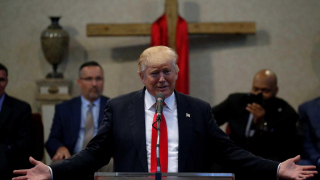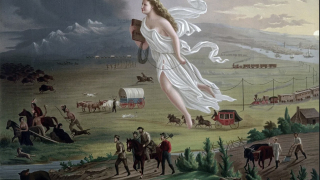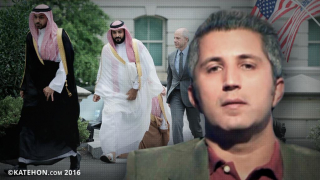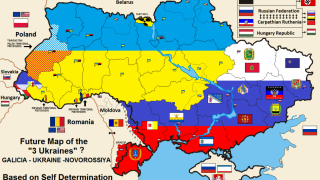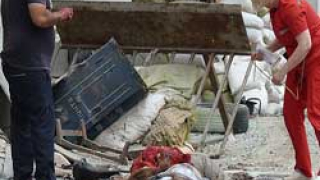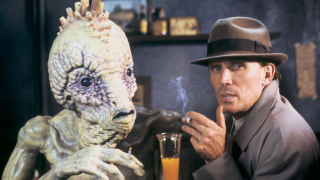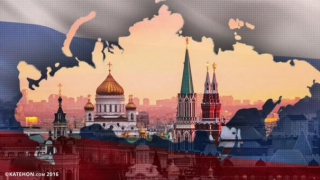Auschwitz and the Power of Propaganda
Title got your attention? No, it’s not going to be… that. Read on.
While the rest of the world (or a few Europeans, anyway) is obsessed with yet another “Polish death camps” episode, this time on CNN, a somewhat more significant historical scandal brewed between Poland and Russia.
Explaining away Poroshenko’s status as a guest of honor alongside the refusal to invite Putin to mark the 70-year anniversary of the liberation of Auschwitz, which takes places today on January27th, the Polish FM Grzegorz Schetyna said:
The 1st
Ukrainianfront andUkrainiansliberated [the concentration camp], as on thatJanuaryday there wereUkrainiansoldiers, so they opened the gates of the camp.
Sure, there were Ukrainian soldiers there. But the majority were Russian. And dozens of other nationalities, including Poles. The “Ukrainian Front” was a mere geographical/military marker that had precisely zilch to do with ethnicity.
If one were really into beans-counting, the purely military contribution of Russians substantially outweighed that of Ukrainians – both in terms of their presence in the Red Army, and their military losses (this is, of course, after adjusting for relative population sizes). There is nothing political about this; it was just a logical consequence of Ukraine being occupied for the first half of the war, and being unable to contribute conscripts.
Mr. Schetyna could just have been honest about it. We don’t like you, Vlad, so why don’t you take a hike. Or simply answered without answering. Foreign Ministers are supposed to be good at that.
But no, he had to snub not only Putin, but the entire Russian people.
(Incidentally, what makes this all the more ironic is that Poroshenko, as the President of the Maidan, represents many of the ideological descendents of Ukraine’s collaborationist forces – the same ones who killed and ethnically cleansed the Poles and Jews who had previously constituted a majority inWest Ukraine’s cities during the antebellum period. And who are even now, as they have been these past two decades, busy rewriting Ukrainian history textbooks to whitewash the role of the UPA. But today, that is of scant interest to Israel, and none at all to Poland. While that might not be “nice” or “fair” of them, it certainly isn’t illogical either. So far as they’re concerned, even a Ukraine led by zombie Hitler would be preferable to a Ukraine back in Russia’s orbit, even if Russia was to hold electKhodorkovsky President and celebrate it with a massive gay parade in Moscow this very day. That is because an independent Ukraine can never be a geopolitical threat to Poland, whereas Russia mostly certainly can).
Does it matter?
While in the short-term it might be a faintly ridiculous spat, in the longterm it might well come to be seen as part of a process of alienation that has already been going on for decades.
For all the fuss made about them, nobody is going to start believing in the existence of “Polish death camps” – as in Polish Polish, not Nazi-occupied Polish – anytime soon; it’s not even an intentional mistake, for crying out loud. Nor is general Holocaust denial going to become a thing outside the danker corners of the Internet. That is because both Poles and Jews are now pretty much integral members of the Western community, so it’s hard to imagine their voices and historical memories ever getting drowned out.
This was not the case with the Soviet Union, and it is not the case with modern Russia.
Today’s popular Western conception of the Eastern Front is quite at odds with reality, heavily based as it is on the embellished reminiscences of Wehrmacht generals and ahistorical visual media fluffpieces, fueled by Cold War emotions, and with no popularly accessible Russian side of the story. So today most Westerners believe all manner of myths about the Soviet Union’s role in the war, from the discredited “two men per rifle” trope to it being the Americans who kicked Nazi ass anyway.
The cold statistics of the balance of Axis casualties between the Western and Eastern fronts – around 75%-80% of their manpower and aircraft losses accrued to the Soviets – fundamentally belie this idea of American preeminence. While you could argue legitimately argue that Lend-Leaseprovided the thin but critical margin in materiel that averted a Soviet collapse in 1942, as Mark Harrison does, or that a Germany that only had to fight on one front could have eked out a stalement in 1943-44, it is completely ludicrous to argue that the Western Allies could have conqueredGermany had it been free to concentrate the bulk of its military assets to the west. Despite a successful deception operation and facing undermanned German divisions, D-Day was a closer call than is commonly appreciated. While history often doesn’t have clear answers, this is not one of those cases: The Soviet Union was the only unequivocally indispensable party in the defeat of Nazi Germany (and, incidentally, bringing an end to the Holocaust).
But most Westerners have no idea. To them, the Eastern Front is a place of zerg rushes and Russianrapine, while the real course of the war was decided in North Africa, the Atlantic, and the beaches ofNormandy.
Think I’m exaggerating? If so, then it’s probably because unlike 95% of the population, you’ve just read too many actual history books (there are many very good serious English language historians in this area: Glantz, Overy, Bellamy. Not Antony Beevor, who probably sold ten times as many books as the first three combined. Should tell you something). Normal people don’t read those books, not even Beevor; they watch Enemy at the Gates and play Wolfenstein instead.
And this is what they have come to believe:
This is a series of polls that took place in France in 1945, 1994, and 2004, respectively, asking which nation was most responsible for the defeat of Germany. Right after France’s liberation, withAmerican and British soldiers walking the streets, a solid majority of 57% nonetheless believed that it had been the Soviet Union. But by 2004, the situation had cardinally reversed itself, with 58% now crediting the Americans and only 20% – the Soviet Union. This even constituted a decline relative to 1994, despite the intervening decade having been one of the best ever for West-Russia relations. The fact that great bulk of German divisions and airpower were destroyed on the Eastern Front pales into insignificance besides the power of Cold War and just plain anti-Russian propaganda acting on the human biomasses over the course of two generations. (Interestingly, the most “pro-Soviet” group in the 2004 poll was not, as you might expect, supporters of the Communist Party – whose 20% was exactly in line with the national average – but the Front National, with 33%. As sovereigntist successors to De Gaulle, who dreamed of a Europe from Lisbon to Vladivostok and whose only real issue with Russia was its then Communist ideology, this should not be too surprising).
I haven’t seen any similar polls from the US or Britain, but I very much doubt they would be substantially different.
With the West and Russia once again growing estranged from each other, and the level of propaganda and mutual recriminations returning to Cold War levels, one wonders what Americans andFrenchmen in 2104 might answer when asked who they think liberated Auschwitz.
Will it be the Americans? Or maybe even a German-Ukrainian combined joint task force? The latter, at least, is presumably what the Ukrainian PM Arseny Yatsenyuk wants the world to start to believe.




